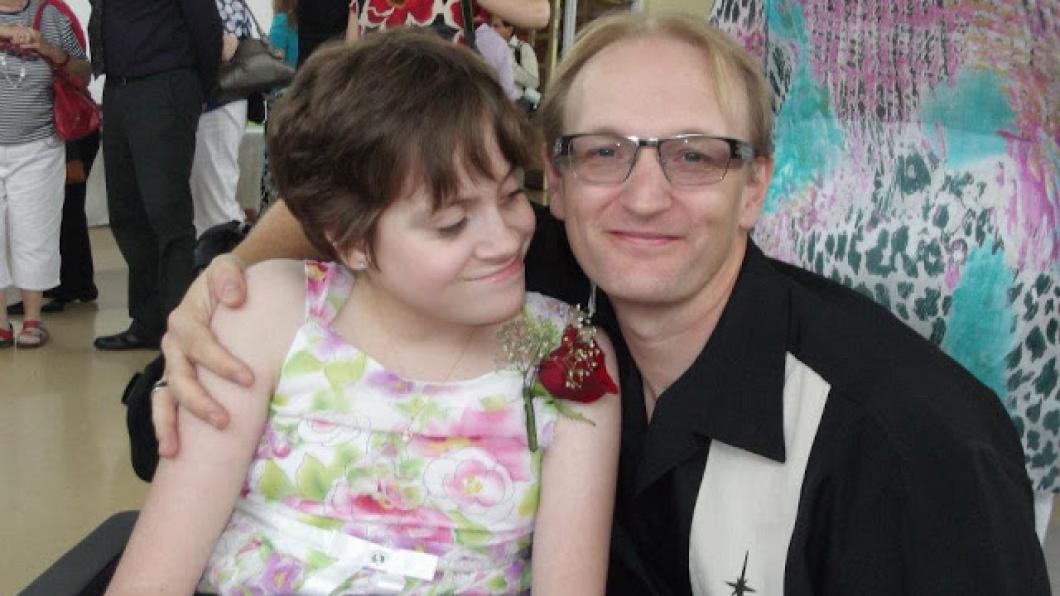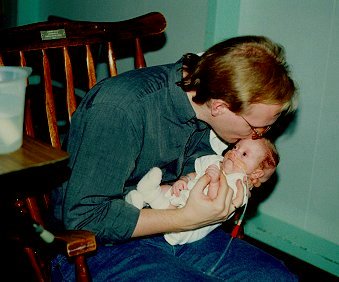
Wanted: Dads raising kids with disabilities
By Louise Kinross
Matt Swan has been raising his daughter Leah, 16, on his own for over seven years. Leah was born with spina bifida and hydrocephalus and uses a wheelchair and g-tube. Before he separated from his wife, Matt worked from home so he could be primary caregiver. He’s eager to connect with other dads of kids with disabilities, particularly those who, like him, have full custody.
BLOOM: How did you react when you learned Leah would have disabilities?
Matt Swan: I didn’t know she would be disabled until the week before she was born. I was still trying to process it when she arrived prematurely. She was taken away in an incubator and the neurosurgeon started telling us what her disabilities would mean.
It was like getting repeatedly punched. ‘She’s going to be in a wheelchair.’ Punch. ‘She won’t be able to feed herself for the rest of her life.’ Punch. ‘She’s not going to talk.’ Punch. ‘She’s going to be mentally retarded.’ Punch. When you get punched that much you go numb.
BLOOM: What did you do?
Matt Swan: My wife was recovering from a C-section so I left the hospital for a walk to collect myself. It was a beautiful autumn day and all the leaves were turned. The one question that kept circling in my mind was ‘Why me? What about all the healthy children who were born to people who didn’t want kids? Why did I have to have a child who was disabled?’
I’m not a religious person, but it occurred to me that Leah being born into our family was some part of a grand design because she needed parents who could give her a good life. The light switch went on: ‘I’m going to do my best to show her the beauty of the world and give her the life she deserves.’ I made my peace with it.
BLOOM: What about Leah’s mom?
Matt Swan: She didn't have that moment like I did. I think she had trouble accepting and coping with the reality of Leah's condition. I arranged to work from home so I could care for Leah and take her to all her appointments. She had about 25 surgeries in the first three years, so it was really difficult. The stress took its toll on our relationship.
BLOOM: How is Leah affected by her disabilities today?
Matt Swan: She uses a wheelchair and is diapered and g-tube fed. Psychologically she’s about the age of a five year old. She goes to public school and is in a special class.
She has words and sentences. She doesn’t say much, but I know there’s a lot more she’s processing than most people give her credit for. She often surprises me with things she remembers. Some people don’t understand her speech, but I know what she’s saying.
She loves to watch Sponge Bob and America’s Funniest Videos. Her iPad is like an appendage to her.
She’s a beacon of light. She’s so happy, funny and positive that everyone who meets her falls in love with her. She’s a joy to be around. I’m tremendously proud of her.
BLOOM: What was it like to become a single dad?
Matt Swan: It wasn’t really an adjustment day to day, because I was used to her routine: bathing her, sending her to school, feeding her, changing her diaper, taking her to appointments. One of the challenges I’ve faced is being accepted as a parent. When it comes to single-parent families, everyone assumes the mother has custody and is the primary caregiver. I get a kind of shocked, stunned look when I tell people.
I also realized the system was quite different for single dads. In the first year we were visited about four or five times by Family and Children’s Services to do welfare checks. A government worker even suggested that it wasn’t appropriate for a single man to raise a little girl. I was appalled. Do single mothers go through this? I don’t think so.
There were other hoops, too. The child tax benefit was automatically going to my ex-wife. When I called Revenue Canada to tell them I had full custody of our daughter, they said I needed letters from her school, teacher, doctor and a notarized letter from a lawyer. After producing all this documentation, I asked what my ex-wife had to do to get the benefit: nothing, they said, just apply.
Seven years later, I still get appointment letters from hospitals addressed to my ex-wife, even though we’ve moved and Leah’s mother lives out of town. Leah’s had five surgeries since last October and her mom showed up for just one of them. The entire time the doctors and nurses addressed her directly and didn’t even acknowledge I was there. Finally I took one of the doctors aside and said ‘It’s fine for you to talk to both of us, but you should know I have full custody of my daughter and she lives with me.’
BLOOM: What would you say was the biggest challenge?
Matt Swan: The greatest challenge for me is the networking part. All parents of kids with disabilities feel like they’re working in a bubble, and no one really understands what we go through.There are a lot of groups for single parents of kids with disabilities but I’ve gone to a couple of them and I’ve been the only man there. At first I’m treated suspiciously: ‘What are you doing here?’ Then I often get sympathy.
I just want to go to these meetings to network, because the system is so big and complex. I need to find out about services and learn what everyone else is doing. But because I’ve been the only man in the group, I’ve often felt awkward: the moms connect with one another in a way that I’m not able to. I usually ask a few questions, listen to other experiences, take notes and leave early.
I’ve looked for single-dad groups but I’ve yet to find one that’s for single dads with kids with a disability. I do feel like an endangered species.
BLOOM: Even though you were used to being Leah’s primary caregiver, it can’t be easy doing this on your own.
Matt Swan: People often say: ‘I don’t know how you do it. It must be so difficult.’ It’s difficult for any single parent, regardless of their child’s level of ability. Leah’s routine is all I know. I don’t have any other children. I don’t feel it’s any more or less difficult, it’s just different.
I work from home, and juggling my family life and work duties can be a challenge. I sometimes feel stretched thin, tired, trapped or frustrated. I had an accident with my van in July and it was written off. It was our way of getting to appointments, so for the past month and a half I haven’t had a vehicle. Getting around has been an even greater challenge.
But when Leah and I are on the couch watching TV together, or when I tuck her in to bed at night and she’s lying there with this little smile on her face, it just makes me melt. I don’t regret any of it, seeing her happy and hearing her laugh.
BLOOM: Does Leah have friends?
Matt Swan: Yes and no. She has people in her life that she likes but she won’t go out of her way to play with them. She likes to be on her iPad.
BLOOM: I understand you became a family leader at Holland Bloorview?
Matt Swan: Since we moved to Toronto six years ago I’ve found the most support being part of Holland Bloorview. I get to meet other people and after a while I see familiar faces and people recognize me and Leah and that’s fantastic. They really get it.
BLOOM: What advice would you give other single dads?
Matt Swan: Get out there and get connected, which is true for all families. As men we’ve been nurtured to be tough and strong and act like nothing bothers us, but that’s completely not true. We see our kids suffering and we do get emotional. It is tough some days and it’s difficult to work through those feelings. You have to have someone to talk to. I talk to my family and friends on the phone. But I don’t usually talk to other parents of kids with disabilities.
I use respite when I can. At first it was difficult for me because I felt like I was validating everyone’s suspicions that I can’t take care of my daughter. After being scrutinized by Family and Children’s Services it left me wondering whether dads are inferior parents. I just don’t believe that’s true. I miss her when I put her in respite, but you really need that time as a parent. You have to take care of yourself. Leah doesn’t get homesick and she adapts so well to new people and situations. She looks forward to her time away.
BLOOM: Are you interested in starting a group for single dads raising children with disabilities?
Matt Swan: I am. I’d love to hear from other dads raising kids on their own. I can’t be alone out there. It’s important to have that support. Even though we’re under societal pressure to fill this ‘tough guy’ male stereotype, we still have worries, doubts and confusion. The system itself is very confusing. It would be great for us to have a meeting to share experiences and ideas, even informally, like over a game of pool.
Matt Swan can be reached at canaderik@gmail.com
